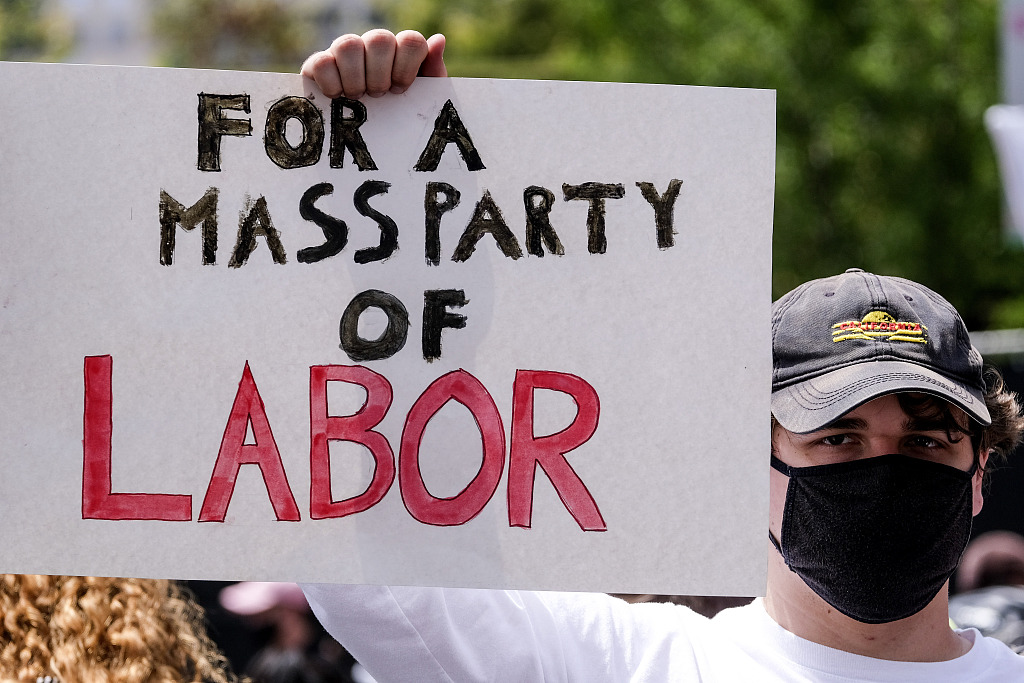The many meanings of May Day
- By Mitchell Blatt
 0 Comment(s)
0 Comment(s) Print
Print E-mail China.org.cn, May 10, 2021
E-mail China.org.cn, May 10, 2021

As an American, I did not grow up celebrating either version of May Day.
I didn't celebrate the ancient pagan holiday honoring Flora, the Roman goddess of flowers, which involves dancing around a maypole with bundles of wheat.
I also didn't celebrate International Workers' Day, the celebration of labor and the working class. It is a day of strikes, marches and rest for the middle class in countries that mark it as a statutory holiday.
May Day seemed so foreign in the capitalist empire, which is weird, because International Workers' Day actually began in the United States.
The first International Workers' Day was conceived by Samuel Gompers, president of the American Federation of Labor (AFL), to take place on May 1, 1890 in order to continue the fight for an eight-hour work day. Gompers chose that day because it was approximately the four-year anniversary of the Haymarket Massacre, the culmination of the authorities' brutal crackdown on striking workers from the McCormick Harvesting Machine plant.
The immigrants working at the Chicago plant, facing the brutal repression of barons who employed thugs against union members, demanded an eight-hour workday and set their deadline for May 1. They had already been harassed by the notorious private security mob known as the Pinkertons. The workers who had tried to form a union were locked out the factory and when they surrounded it on May 3, the police fired on them, killing at least two.
The bloodshed initiated by the police set the stage for an even larger rally the next day, and the police sent a much larger force to disperse the crowd. As the uniformed officers surrounded them, a bomb was thrown by someone in the crowd. It killed one officer on impact and six others from their wounds. The police responded by firing into the crowd, killing four and injuring more than 100 workers.
In the aftermath, there was hysteria against labor activists, radicals, and anarchists. August Spies, an anarchist newspaper editor who spoke at the rally, was arrested, despite having urged non-violence. Of the eight defendants accused of involvement in the bombing, half of them were not even present when the bomb was thrown.
Yet, all eight of them were convicted, with seven of them, including Spies, sentenced to death. In fact, the mass trial was so unjust that two Illinois governors pardoned three of the convicted. Spies, however, was one of the four who would end up being hanged. Before he died, he shouted, "The time will come when our silence will be more powerful than the voices you strangle today."
And so it was. Previously disjointed groups of laborers "all got together for the first time on the political field in the summer following the Haymarket Affair," wrote historian Nathan Fine. The AFL voted to organize a strike on May 1, 1890, carrying on the fight and AFL President Samuel Gompers informed the Second International of his plans. Hence, the movement that began in a cold square on the banks of a great North American lake spread to the world.
For the first few years, Americans celebrated International Workers' Days and participated in massive labor activity. When Pullman rail workers went on strike in 1894 after massive layoffs and wage cuts in the middle of a recession, rail tycoons, who had previously resisted government regulation, begged the government to step in and help them. President Cleveland obliged, sending troops to Chicago, where they killed 30 strikers. President Cleveland then signed an order recognizing American Labor Day as an annual holiday taking place during the first week of September – so as to separate American labor from their international brethren.
Although most Americans simply ignore May Day, its status as Loyalty Day still remains the official law of the land. Even President Biden issued a proclamation on April 30 celebrating "Loyalty Day."
In his proclamation, Biden noted the significance of the day as also being International Workers' Day and took the space to "honor the workers whose service and sacrifice has helped turn the tide against the COVID-19 pandemic. On this day we show our gratitude to our essential workers..."
It might seem an illustration of how incoherent America's view of May Day is, that a president would praise labor during a holiday meant to undermine labor, but it is in keeping with the history of Americans' recognition of the day. That is, the American government and corporations reward the workers sacrificing their bodies with "gratitude," but not with increased wages or protections for their well-being.
These days, the labor movement in America is weak. The rate of unionization declined from a peak of around 30% in the late 1950s to 6.3% in the private sector in 2020. Tech companies continue to abuse loopholes in the rules surrounding the "gig economy" and refuse to pay workers fairly or provide required benefits, while burdening them with the risk of liability.
May Day may have gone through transformations since its conception, but the struggle remains the same.
Mitchell Blatt is a columnist with China.org.cn. For more information please visit:
http://m.keyanhelp.cn/opinion/MitchellBlatt.htm
Opinion articles reflect the views of their authors, not necessarily those of China.org.cn.
If you would like to contribute, please contact us at opinion@china.org.cn.





